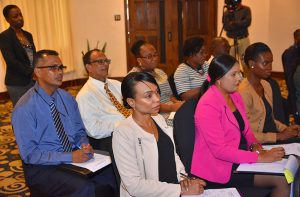…de-risking, evaluation of Barbados high on agenda
BARBADOS Mutual Evaluation, and the issue of de-risking are among areas that will be discussed when the Caribbean Financial Action Task Force (CFATF) 46TH Plenary and Working Group meetings are held here next week at the Marriott Hotel.
Over 163 participants from 26-member countries are expected to arrive in Guyana for the conference slated for November 12 to 16. Participants will be drawn from CARICOM countries as well as Central and South American nations.
The International Monetary Fund (IMF) and the World Bank and Organisation of American States (OAS) are among international bodies that will be present.
Ahead of the conference, the Attorney General Chambers and Legal Affairs Ministry hosted a seminar for the Guyana delegation at Herdmanston Lodge on Monday to discuss several critical areas, including the Amendments to the Anti-Money Laundering and Countering the Financing of Terrorism (AML/CFT) Act, and the standard to be met for Guyana to exit the 4th Round of Mutual Evaluation.
In addressing the delegation, the Attorney General, Basil Williams, said the conference is being held at a critical time when the effects of money laundering and terrorist financing are being felt worldwide.
Noting that while it is a honour for the country to host the Plenary and Working Group meetings, the local delegation must be knowledgeable of the Financial Action Task Force (FATF) and Caribbean Financial Action Task Force (CFATF) regimes in particular the 40 recommendations. “Mutual Evaluation is the business of CFATF,” Minister Williams reminded the delegation, while noting that subsequent to this plenary, there will be two Mutual Evaluations at every plenary.
In Guyana, Barbados would undergo Mutual Evaluation.
“They have a report in and they are going to be assessed on that report and that will determine their status whether they would have satisfied and done enough to exit the fourth round,” the Attorney General explained to Guyana Chronicle on the sideline of the seminar.
For countries like Haiti, St. Vincent, and St. Maarten, a compliance report from the International Cooperation Review Group (ICRG) would determine whether they can exit the 3rd Round of Mutual Evaluation.
In addition, a wide range of financial and security matters would come up for discussion. “The problem in this region is that we were de-risked and de-banked (many countries in the region), so we will have to deal with those issues. We have to deal with issues of beneficial ownership…and the requirement for customer due diligence, and in some other cases, enhanced due diligence,” Minister Williams explained.

According to FATF, de-risking refers to situations where financial institutions terminate or restrict business relationships with categories of customer. The severing of correspondent banking relationships has impacted the performance of the four key macroeconomic sectors: real, fiscal, monetary and external.
Turning his attention to Guyana, the Attorney General said that while significant progress has been made in addressing the deficiencies within the countries AML/CFT regime, the 4TH Round is a critical one. When this APNU+AFC Administration took office in May 2015, Guyana had been blacklisted both by CFATF and FATF, however, with leadership from President David Granger and the Attorney General the country made significant progress in improving its AML/CFT regime and adequately addressing the key AML/CFT deficiencies identified. It was on that basis, that the CFATF Plenary of November 2016 agreed that Guyana be removed from the CFATF ICRG process.
“We must emphasise the role of the President, Brigadier David Granger, from the onset, he gave the FATF the high political commitment that Guyana would work with FATF and the CFATF to implement the recommendations, so that Guyana could contribute to ridding the world of money laundering and terrorist financing,” the Attorney General stated.
Minister Williams explained that while in the 3rd Round of Mutual Evaluation emphasis was placed on the legal and regulatory framework, during the 4th Round the country’s effectiveness in addressing the deficiencies will be tested.
“CFATF will be looking to see convictions, so that you can’t come and say you have a thousand charges or a thousand matters went to court, but then you don’t have any convictions, you would be rated very poorly for the level of effectiveness,” he explained.
With Guyana already in the 4th Round, it will come up for evaluation in 2022. “We have to start from now putting in place and remedying the areas of weaknesses and deficiencies,” he stated. Already, the country has conducted a National Risk Assessment (NRA) from which the highest risks were identified.
“I could tell you that one of the highest risk areas would be, the Money Transfer Agencies, and the designated non-financial businesses and professions unfortunately, the legal profession – Lawyers, accountants are high risks,” he further explained. As such, he said the country would have to direct its resources towards remedying the high-risk areas.
The seminar held for the Guyana delegation included presentations by Principal Parliamentary Counsel, Joann Bond, Director of the Financial Intelligence Unit, Matthew Langevine, Special Adviser to the Attorney General, Tessa Oudkerk, among other local representatives from agencies such as the Guyana Revenue Authority and the Special Organised Crime Unit (SOCU).




.jpg)










